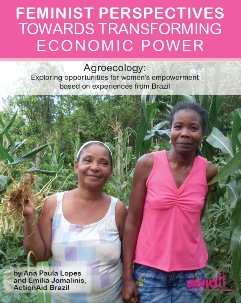[Action Aid Brazil: 2011, 1], "The 2008 food crisis that provoked the global rise in prices of agricultural crops and drove millions of people into hunger has put the corporate-driven agribusiness model back in the spotlight. The search for alternative means of food production based on environmental sustainability is gaining ground across regions with a common characteristic: the need to involve rural men and women, building on their local priorities and knowledge.
Agroecology is not only a way of practicing agriculture or using technologies that do not harm the environment. It proposes breaking with the hegemonic monoculture-based rural development model based on great landed estates, agribusiness, and social exclusion. This article focuses on the paradigmatic case of Brazil, where the capitalist rural development model was strengthened during the Green Revolution of the 1950’s based on intense use of improved seeds (especially hybrid seeds), raw industrial materials (like fertilizers and toxic agrochemicals), high mechanization, and extensive use of technology in planting, irrigation and harvest.
ActionAid Brazil’s analysis of their experiences working with rural women is the basis for this article. The authors examime the relationship between agroecology and feminism and shows how agroecology is an essential tool that can
advance the empowerment processes for Brazilian rural women in family farming agriculture.
Ana Paula Lopes Ferreira is an agronomist and agroecology specialist. She is currently the coordinator of ActionAid Brazil Women’s Rights Program. Emilia Jomalinis has a Bachelor degree in International Relations, majoring in Environmental Issues and is Women’s Rights Adviser of ActionAid Brazil."

